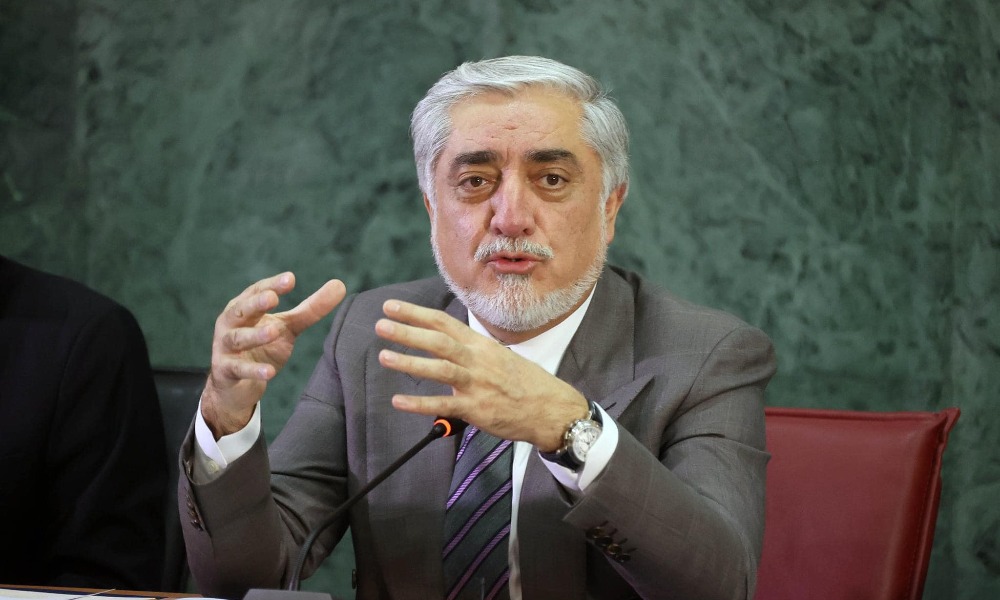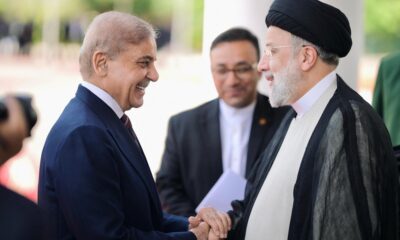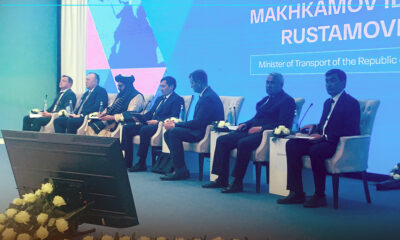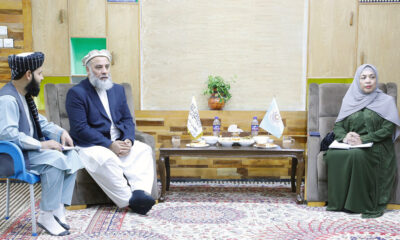Latest News
Taliban remain vague and non-committal about peace talks: Abdullah

Afghanistan’s chief peace negotiator Abdullah Abdullah says there is currently no contact between the Afghan Republic’s talks teams and the Taliban’s representative and that the group continues to remain “vague” on the future of negotiations.
In an interview with VOA, Abdullah, who is chairman of the High Council for National Reconciliation, was asked whether there was any contact between the two teams. His answer was a definitive “No!”
“They leave their positions vague. They say, ‘We want the establishment of an Islamic system,’ but don’t explain what that means. How will the leaders be elected or selected? They want an Islamic Council. Is it elected? If elected, on what basis? They don’t share,” he said.
Abdullah also stated that different groups of Taliban make contact from time to time. “Sometimes they send notes. The messages are mainly the same. Even in the letter (sent to politicians recently), the position is very vague, and you cannot tell whether it is the position of one group or all.”
He also said that with the announcement of the withdrawal of foreign troops, the Taliban’s “position has changed.”
“Their chief negotiator has gone to Pakistan to consult with their leaders, to take directions, to shape up their position. Earlier their position was that they are going to attack the international forces.
“So, as far as the Doha process is concerned, it is still important. So are other opportunities like the conference in Turkey [the Istanbul conference]. It has to be a meaningful event, and both sides have to come to an understanding to make it effective,” he said.
The Taliban has however until now refused to attend the Istanbul Conference, saying they will only participate once all foreign troops have withdrawn from Afghanistan.
“If they don’t come to a meeting, which is supposed to be between both sides, then the conference will not take place. They haven’t said that they are not coming. They haven’t said that they are coming. That has been the problem negotiating with the Taliban all along. They always keep their position vague,” Abdullah said.
On the withdrawal of troops, Abdullah said there is concern that the “Taliban position might get further emboldened” after foreign forces leave.
“Well, as far as their excuses, or the reasons that they were giving, that it is because of the presence of the international forces, it’s ‘jihad’ against foreigners and so on and so forth, so, in three months time, perhaps in less than three months time, there will be no foreign troops on our [Afghanistan’s] soil.”
He also said he “hopes” and “wishes” the Taliban want peace adding “otherwise, the war will continue.”
Abdullah stated that a civil war cannot be ruled out but said: “Let’s not lose hope because it will be a worst-case scenario. So, at this stage, the whole focus should be on how to make it (peace) work.”
Latest News
Iran, Pakistan leaders raise concerns over ‘terrorist groups’ in Afghanistan

Following a two-day official visit to Pakistan, Iranian President Ebrahim Raisi and Pakistan’s Prime Minister Shehbaz Sharif issued a joint statement emphasizing the need to further expand commercial and economic cooperation and transform the common border of the two countries from a “border of peace” to “border of prosperity”.
The two leaders also strongly condemned aggressions and crimes of Israel in Gaza, and demanded an immediate and unconditional ceasefire, as well as unimpeded humanitarian access to the besieged people of Gaza.
Numerous other issues were also discussed but on the topic of Afghanistan, they jointly declared their commitment to the development of Afghanistan as a peaceful, united, independent country free from the threats of terrorism and drug trafficking.
According to the statement the two countries pointed out that the existence of terrorist organizations in Afghanistan is a serious threat to the security of the region and the world.
The two sides stressed their desire to strengthen cooperation in the field of fighting terrorism and ensuring security and creating a united front against terrorism.
They also discussed the importance of coordinating regional and international efforts to ensure security and stability in the region.
“While respecting the sovereignty and territorial integrity of Afghanistan, the two sides recognized that increasing participation of all strata of Afghans in basic decision-making will lead to the strengthening of peace and stability in this country,” the statement read.
Latest News
Over 1,000 Afghan refugees forced out of Pakistan in one day

The Ministry of Refugees and Repatriations (MoRR) says over 1,000 Afghan migrants were forcibly returned from Pakistan on Tuesday through Spin Boldak border crossing in Kandahar province, the ministry said in a statement.
The ministry stated that based on information provided by the Spin Boldak Kandahar border command, these returnees comprised 191 families, totalling 998 people.
In addition, three migrants released from Pakistani prisons were also returned, according to the statement.
The statement added that after registering the returnees, the refugees were referred to the offices of the International Organization for Migration (IOM), the World Food Program (WFP) and the United Nations High Commissioner for Refugees (UNHCR).
Each family received 10,000 afghanis – paid to them by the Islamic Emirate.
In another statement, the ministry said that 2,783 migrants living in Iran voluntarily and forcibly returned to the country during this week.
Latest News
Afghanistan’s minister of transport and aviation attends regional meeting in Uzbekistan

Hamidullah Akhundzadeh, acting Minister of Transport and Aviation, headed a delegation to Uzbekistan for a ‘Six-Party Corridor’ meeting that included representatives from Afghanistan, Russia, Belarus, Pakistan, Kazakhstan and Uzbekistan.
On the sidelines of this meeting the Afghanistan delegation discussed trade through the corridor with the other five relevant countries.
According to the ministry of transport and aviation, Akhundzadeh met with the deputy ministers of transport of Russia and Belarus.
He also discussed ways to expand transit between Afghanistan and Russia; and Afghanistan and Belarus, and provide the necessary facilities to achieve this.
The ministry added that the acting minister had a bilateral meeting with the Minister of Transport and the Special Representative of the President of Uzbekistan on Afghanistan and discussed the expansion of road transport between the two countries.
-

 Sport4 days ago
Sport4 days agoAfghanistan Champions League kicks off with grand opening ceremony
-

 Regional5 days ago
Regional5 days agoIran’s foreign minister downplays drone attack, says Tehran investigating
-

 Latest News4 days ago
Latest News4 days agoPakistan’s frontiers minister stresses ‘dignified’ return of Afghan refugees
-

 Business5 days ago
Business5 days agoAfghanistan’s economic prospects are bleak: World Bank
-

 Latest News4 days ago
Latest News4 days agoMore than 800 Afghan refugees deported from Pakistan in two days
-

 Regional2 days ago
Regional2 days agoIranian president lands in Pakistan for three-day visit to mend ties
-

 Climate Change3 days ago
Climate Change3 days agoMassive river flooding expected in China, threatening millions
-

 Latest News4 days ago
Latest News4 days agoChinese keen to invest in Panjshir-Kabul water conduit project
























